The firm was determined to show the offer was not limited to office-based staff and those working from home. Dave Rogers reports

Sir Robert McAlpine teamed up with consultancy Timewise to understand how on-site construction could benefit from flexible working.
Over the past few months the firm has set up two trials, one at its Riverside scheme – an office job in Sunderland – and also at the Shepperton studios project in Surrey.
Initial consultation with employees revealed that they were keen to continue working full-time on site, but with adjusted hours.
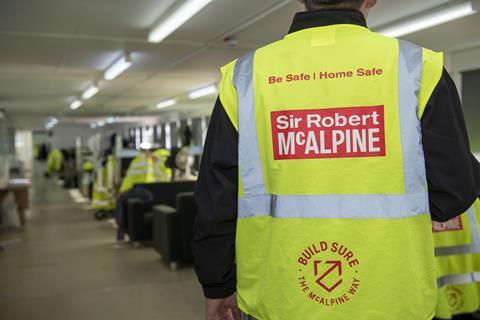
At Riverside they elected to work longer hours from Monday to Thursday, which enabled them to finish at lunchtime on a Friday. At Shepperton they chose to trial one flex day every three weeks and implement working from home for more operational roles.
On the Shepperton site McAlpine also introduced a “flex-buddy” system, which partnered each employee up with another member of the site team who was then responsible for the other’s key functions when the “buddy” was taking a flex day.
Feedback from both trials has been overwhelmingly positive. Employees at Riverside reported that the flexibility gave them the opportunity for self-care, extra time for childminding responsibilities and allowed them to properly recharge their batteries.
>>Click here for more on the Building the Future Commission
As a result of this success, the arrangements at Riverside will remain in place until the project completes while the trial at Shepperton will be extended for another six months.
This is what some of the people at the Sunderland Riverside scheme had to say:
Peter Andreasen – Bricklayer
I’m not taking the Friday afternoon off every week, just when it suits me. It’s handy to have the option to take the time if you have an appointment to attend, or something you need to sort at home.
It’s great because, by being able to work the hours through the week, I don’t end up losing any money.
Ryan Mackay – Joiner
I’ve taken the time on a Friday afternoon most weeks. I’ve really enjoyed it and it’s great that it gives me more time at home and the opportunity to make more of my weekend.
I recently went on a camping trip over a weekend, and it meant I could set off earlier on the Friday and make the most of it. That way I didn’t even need to use holiday.
John Pownall and Richard Laverick – GCOs
It’s spot on. It gives you the chance to do things with your family that you wouldn’t normally have the time to. We’ve never been able to do anything like this before and it feels like the company are trying to give you a bit back.
The biggest benefit of it is definitely getting to spend time with your family. I can’t see any negatives and think it’s great. If the works on site mean that you do need to stay on the Friday, then you could make it work on a different day.
Aislinn Chambers-Hey – Trainee design co-ordinator (pictured)
I think it has been great to have the option to partake in flexible working and you can see the positive impact it is having on everyone’s work-life balance for those adopting into flexible hours in the office and on site. As I am not from Newcastle and live away from my family home, having a half-day on a Friday allows me to travel down to see my family and friends and get to spend the full Friday evening with them instead of arriving late in the evening.
In my opinion it is brilliant to have what feels like a much longer weekend through working a half-day on a Friday.
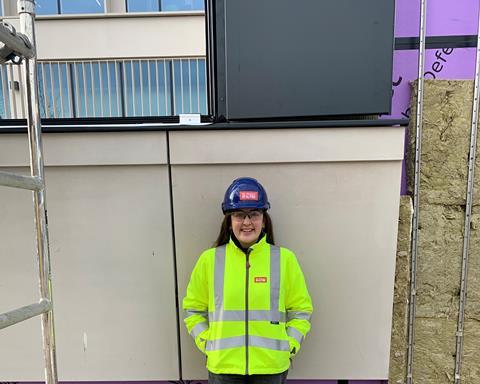
Kyle Lindsay – Scaffolder
I take every other Friday afternoon off to pick up my child from school. It’s nice because I wouldn’t normally have had the chance to do that before.
I think it’s good that people can choose if they want to work the additional 30 minutes on the Monday to Thursday and take the Friday afternoon. It’s good that it’s a choice for what works for the individual.
Mitchell Hodgson – Student engineer
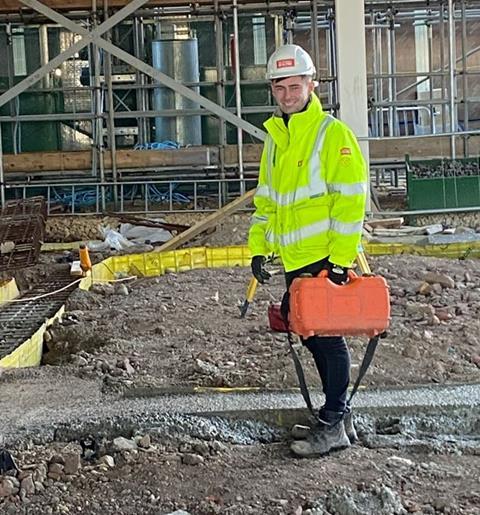
It’s great to have the longer weekend and gives you more time on the weekend to recharge, especially as I am studying and working. It works well with our subbies too, because they generally finish at the same time on a Friday.
I think it’s a real positive that the company are focusing on flexible working to help give employees a better work-life balance. I’m really pleased that it’s an option that available to us. It was already a great site team to be a part of and people are even happier on a Friday!
David Kirby – Senior design manager
It works really well for me and makes a big difference. I would be gutted if it was to stop. When you get to a certain age, time becomes more important to you. Being able to have proper quality time with my wife on a weekend is so important.
My driver is definitely to have better work-life balance. You can use the Friday afternoon to deal with all of your “life admin”. Having the time on the Friday means that you can be refreshed to enjoy the Saturday and Sunday and to get a proper weekend.
I’ve found it so positive, and I think having that time also has a real positive impact on people’s mental health.
Graeme Elmy – Ganger (pictured)
It’s brilliant having this option in place and I hope the company keep it. We’ve worked long hours for years and years and it’s good to feel like you are getting something back.
I’m going out shopping this afternoon for my wife’s birthday present, normally I wouldn’t have had the time to do it and would have been rushing around. I also went on holiday to Tenerife in December and I only had to take half a day of leave on the Friday because I’d built up the other hours through the week.
This should have been done years ago. You miss all the traffic on the way home and get a proper Friday afternoon and evening. It’s a great feeling on a Thursday evening knowing that your weekend starts at lunchtime the next day.
Having the extra time at home makes such a difference. I couldn’t speak more highly of the positive impact it’s had for me.
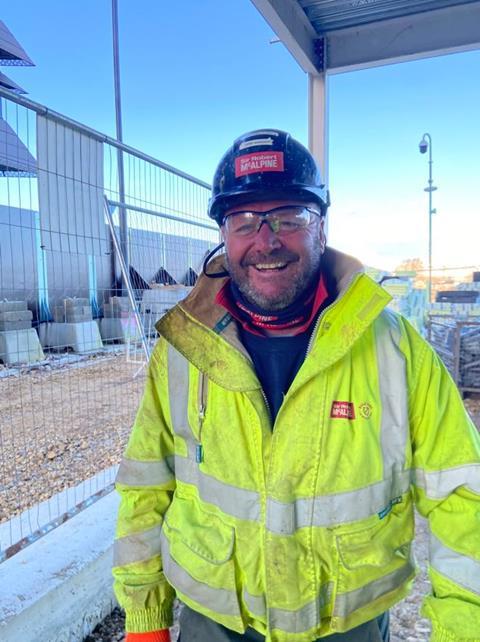
Tony Elliott – Gate person
I have been taking the Friday afternoon every week and it’s been good because it means I get home earlier and can help my wife with the food shopping without having to be rushing about. We do the food shop on the Friday afternoon so then we can enjoy the time at the weekend.
Steven Donoghue – Chief engineer
I originally didn’t think that it could work for my role, but it has gone better than I had thought. It is still a challenge and sometimes I can feel a bit of pressure having everything sorted to leave earlier on the Friday, but it has meant that I can collect my son from school and it has been brilliant to do that because I’ve never had the chance before.
People were really surprised that the company were implementing this at first we’ve seen lots of articles and things on Mother Pukka, so it has been really nice to be a part of something the company are doing.
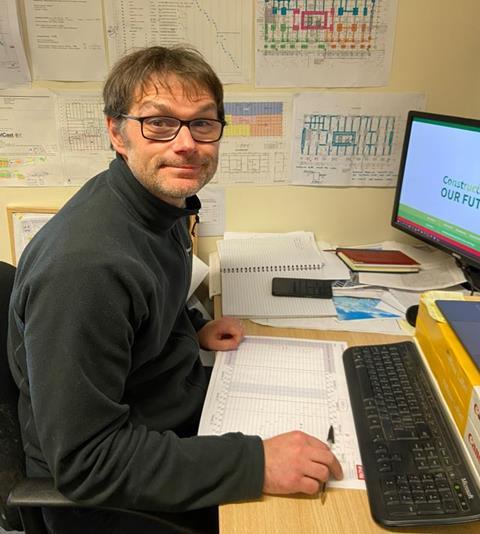
James Killick – Planning manager (pictured)
I have been using the Friday afternoon on an ad-hoc basis. It’s nice knowing I can take the time and not feeling guilty or uncomfortable about leaving earlier. I think it makes a massive difference and that you then have a “good” weekend.
It’s nice to get home on a Friday afternoon and have some time to relax and decompress before my wife finishes work. Then we can have a proper evening together and enjoy it, rather than feeling like you just rush in for tea and then to sleep.
I’d say it gives you the opportunity to feel more refreshed and give you a break and some time to do something for yourself. You can feel mentally tired after a week at work so having that time really helps, especially as you are getting older.
Tommy Dixon – Chief engineer
I think it’s a real positive that the long-hours culture is being highlighted and that the company are taking steps to address it. This has been particularly positive for the works staff and made a really big difference to them.
Bringing flexibility to on-site construction
While flexible working is now part-and-parcel of everyday working life for many of us, the same cannot always be said for frontline workers, such as construction professionals working on site. With its location-based work, inter-dependent team roles and rigid deadlines, it has proven to be a very tough nut to crack and the options for flexibility seem more constrained than other sectors.
However, flexibility isn’t just about being out of the office and getting to work from home for two days a week. True flexibility can encompass either workplace, workload or work pattern. This is why, over the past year, we have been working with Timewise to trial initiatives at our sites at Riverside and Shepperton to identify opportunities where we can incorporate flexible working into on-site construction.
Flexible working policies need to be inclusive and cater for every individual, in every region and role. This is why we selected two sites in different locations that offered different parameters for evaluation. The Riverside project, for example, is made up of both monthly-paid employees and weekly-paid operatives, while the majority of the people on the Shepperton site are working away from home.
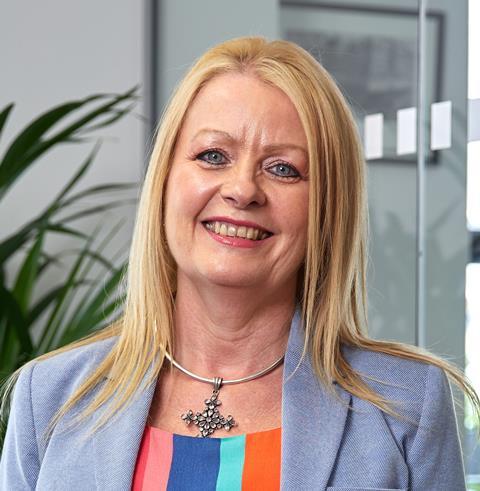
Interestingly, after initial discussions on how to incorporate flexibility in the most beneficial way for the team, both sites elected to predominantly focus on working with more flexible hours. At Riverside, the team opted to finish at lunchtime on Fridays by making up the time earlier in the week, and at Shepperton they decided to trial one flex day every three weeks.
Shepperton also made the choice to introduce a “flex-buddy” system which saw each employee partnered up with another member of the site team, who would then take responsibility for the other’s key functions when they were taking a flex day.
The results of the trial were almost immediately apparent. With no drop in productivity, on-site workers reported that they were able to spend more valuable time with family, while also feeling that they had greater opportunities for self-care and, more importantly, a chance to properly recharge their batteries. This is a key achievement in a sector such as ours, which is plagued by a mental health crisis.
Clearly, there is scope to introduce flexible working policies on-site and, with flexible working now a key factor in recruitment, businesses can get ahead of the pack by introducing similar policies quickly. Perhaps more importantly, it also goes to show that we can create an attractive working proposition for the sector – a crucial tool in the face of the industry’s current skills shortage.
Karen Brookes is director, people and infrastructure at Sir Robert McAlpine
What the commissioners say
From my perspective it is great hearing how construction site companies are flexing their on-site working hours. Given the trends that we are now seeing and with the expectation that businesses must look after their employees more holistically than in previous decades, our team now almost see this as an expected way of working.
It’s proven that an employee’s productivity increases if they are happy at work. Fact. So, to find out ways to keep morale and motivation high is the way forward. If we don’t do it, someone else will and we will lose out.
Richard Steer - chair, Gleeds Worldwide
Just as some ‘desk based’ businesses are now adopting a four-day working week, it is exciting to see a giant of the construction world trailing similar flexibility on building sites.
It was poignant that everyone questioned appreciated the extra time they were afforded to take care of home and domestic matters. And there was no drop in productivity. It is clear that “working from home” in the traditional sense is incompatible with on site roles such scaffolding, painting, bricklaying.
But with a bit of creativity and the open mind set Sir Robert McAlpine has shown that it is possible for the most traditional of businesses to move with the times, and even lead the way for others in the industry.
Lara Oyedele - President, Chartered Insititute of Housing and chief executive, Black On Board
Building the Future Commission

Coming up on the Building the Future commission:
In the coming weeks we will:
- Host our first regional roundtable with our partner Constructing Excellence in the East of England region in mid March
- Convene our first commissioner panel meeting at the end of March
- Investigate the potential of building performance rating system NABERS as an alternative to Part L for the energy and net zero stream
- Interview two big hitters in the world of infrastructure for the infrastructure stream
- Examine whether the qualifications landscape needs to change and assess whether more flexibility is needed for our education and skills stream
- Visit the University of Salford to assess the eHome2 concept for our energy and net zero stream
- Investigate how for-profit affordable housing can deliver the homes we need for the housing and planning stream
- Assess a new model of procurement used by the Ministry of Defence for the project delivery and digital stream
- Look at models of flexible working in the industry for the workplace, culture and leadership stream
About the commission
The Building the Future Commission is a year-long project, launched to mark Building’s 180th anniversary, to assess potential solutions and radical new ways of thinking to improve the built environment.
The major project’s work will be guided by a panel of 19 major figures who have signed up to help guide the commission’s work culminatuing culminate in a report published at the end of the year.
The commissioner include figures from the world of contracting, housing development, architecture, policy-making, skills, design, place-making, infrastructure, consultancy and legal.
The commissioners include Lord Kerslake, former head of the civil service, Katy Dowding, executive vice president at Skanska, Richard Steer, chair of Gleeds, Lara Oyedele, president of the Chartered Institute of Housing, Mark Wild, former boss of Crossrail and chief executive of SGN and Simon Tolson, senior partner at Fenwick Elliott. See the full list here.
The project is looking at proposals for change in eight areas:
- Education and skills
- Housing and planning
- Infrastructure
- Building safety
- Project delivery and digital
- Workplace culture and leadership
- Creating communities
>> Editor’s view: And now for something completely positive - our Building the Future Commission
>> Click here for more about the project and the commissioners
Building the Future will also undertake a countrywide tour of roundtable discussions with experts around the regions as part of a consultation programme in partnership with the regional arms of industry body Constructing Excellence. It will also set up a young person’s advisory panel.
We will also be setting up an ideas hub and we want to hear your views.


























No comments yet